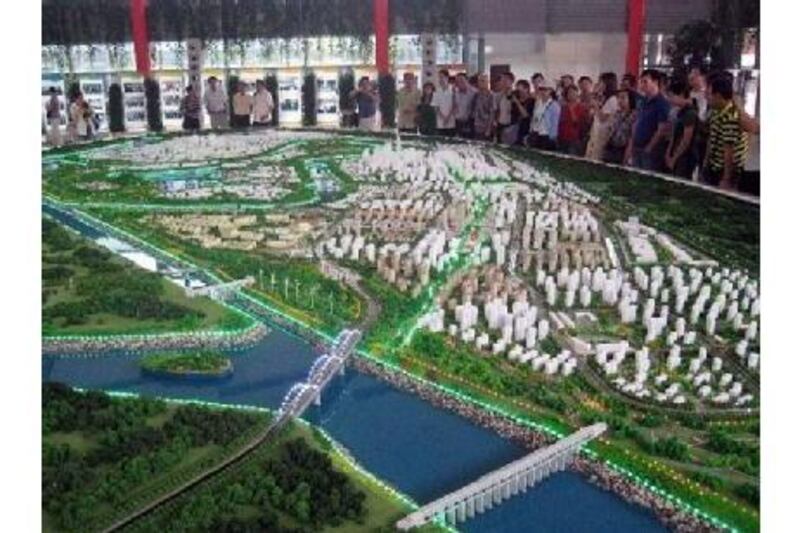The world's biggest consumer of energy is also home to most of the planet's dirtiest cities, an issue the country is making attempts to address, Daniel Bardsley reports from Tianjin Abu Dhabi's Masdar City, despite revising its master plan, is intended to offer a new blueprint for urban living in which the traditional dependence on fossil fuels and private cars is cast aside in favour of renewable energy and public transport.
The project, focused on solar and other forms of alternative energy and cutting waste and emissions, comes as the emirate also pours resources into developing green technology through the associated Masdar Institute of Science and Technology. China, which similarly has a thriving green-tech sector, is also experimenting with its own ideas for eco-cities that, as with Masdar City, are designed to showcase ways to reduce energy consumption, waste production, carbon emissions and pollution.
With China having the dubious distinction of being home to 16 of the world's 20 most polluted cities and, so the International Energy Agency said on Tuesday, with the country having overtaken the US to become the biggest consumer of energy in the world, few would deny that the Middle Kingdom needs to find new ways to clean up its air and limit its growing carbon footprint. Chief among the slew of eco-cities announced in the country is Sino-Singapore Tianjin Eco-City, a 30-square kilometre initiative being developed a couple of hours' drive from Beijing.
Due for completion in a decade's time, the project is designed to be a "sustainable and resource-efficient metropolis" housing 350,000 people. The plan is that most of the wastewater will be recycled, everyone should live within walking distance of shops and other essential services, trains will speed residents to places further afield in the city and much of the power will come from renewable sources such as wind energy.
Cui Yucheng, the vice director of the Tianjin Environmental Protection Bureau, a municipal government organisation, describes it as "a symbolic eco-city". "When the city is finished it will become an example for environmental and eco-friendly cities in other parts, which can be copied in other parts of China," he says. "We are building a complete collection, storage and transport system for wastewater and sewage treatment."
He says such features, along with the transport system, the use of environmentally friendly materials in construction and the "very rational" transport system, were "copiable and promotable across China". Mr Cui says much of the infrastructure for the project has already been built, including the wastewater treatment plant and sewage systems. Such elements of the city are not by any means glamorous but the fact that the authorities have confirmed they are completed shows at least one thing: the Tianjin Eco-City has moved off the drawing board and is taking shape on the flat landscape earmarked for the project an hour from Tianjin. A recent multimillion-dollar cash injection from the Global Environment Fund was another promising sign.
The signs certainly suggest the project will achieve more success than a similar initiative in Shanghai, called Dong Tan, which fell by the wayside despite a high-profile launch that indicated enthusiasm at the highest levels of the Chinese government. China's president Hu Jintao helped to inaugurate the project in a 2005 ceremony also attended by Tony Blair, then British prime minister. Since then, despite much enthusiasm from the eco-city's British designers Arup the project has ground to a halt .
This may be, at least in part, because the former head of the Shanghai communist party Chen Liangyu, who was one of its chief supporters, was jailed in April 2008 on corruption charges, leaving the scheme without a cheerleader in government. A wider slowdown in development in Shanghai was also blamed by some for the project's demise, although Arup has said some of the ideas for the city could be applied in other urban developments in China and that it has had contact with many local authorities in the country eager to hear them.
But even if the Tianjin Eco-City goes a step further and becomes reality, the developers face many challenges. Not least is scepticism about the whole idea of eco-cities in China, with concerns expressed that they are primarily upmarket suburbs and merely showcase projects targeted at wealthy residents and which mask greater environmental concerns in the country. Jonathan Watts, a journalist and the author of When a Billion Chinese Jump about China's environmental record, said recently in Beijing the country was "doing a lot more than most people realise" to promote a low-carbon economy. However, he also said he had visited several eco-cities in the country but was yet to see one that offered a convincing blueprint for future urban development. But he does not dismiss the idea out of hand.
"[They are] experimental. You have to let people fail before you find the right solution," he says. China is making multiple attempts at developing eco-cities across the country, including one near Nanjing and another in Rizhao. In May a ceremony was held to start building work on Gongqing DigiEcoCity, a project that is intended to blend the latest digital technology with sustainability. If developments such as Tianjin Eco-City and the DigiEcoCity prove successful, the implications could be significant; there are hundreds of urban areas slated to grow substantially in the coming decades that could take on board the lessons learnt so far. Environmentalists say this must happen if the eco-cities are to achieve their true potential.
Tom Wang, the chief media officer for Greenpeace China, says the country needs to show "more willingness" to adopt environmentally friendly technology in its fast-expanding second and third-tier cities. "It's almost like a fashion to claim that they're going eco-friendly, but at the same time it's important to realise it's not just words," he says. "There's a lot involved in this." dbardsley@thenational.ae






